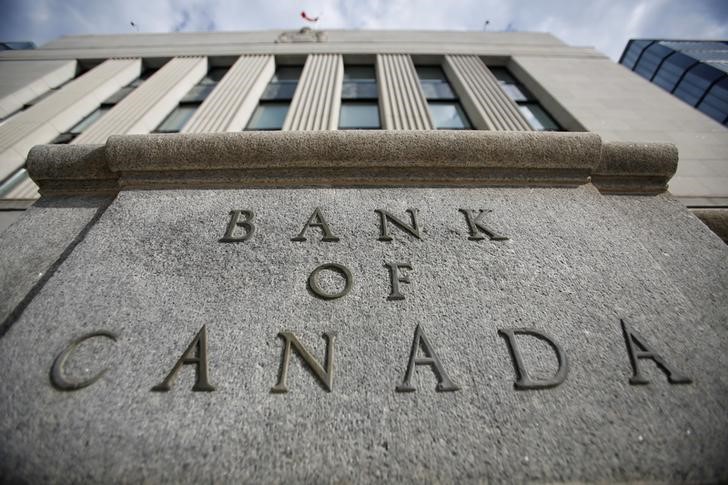By Steve Scherer and David Ljunggren
OTTAWA (Reuters) -The Bank of Canada on Wednesday held its key overnight interest rate at 5%, noting that the economy had entered a period of weaker growth, but said it could raise borrowing costs again should inflationary pressures persist.
The central bank hiked rates by a quarter point in both June and July in a bid to tame stubbornly high inflation, which has remained above the bank's 2% target for 27 months.
Canada's gross domestic product unexpectedly shrank an annualized 0.2% in the second quarter, a sign the economy could have already entered a recession. But inflation accelerated in July to 3.3% and core measures stayed at about 3.5%.
"With recent evidence that excess demand in the economy is easing, and given the lagged effects of monetary policy, Governing Council decided to hold the policy interest rate at 5%," the bank said in a statement.
The bank said it was prepared to hike rates further should inflationary pressures persist, but analysts said the hawkish stance is not likely to mean more increases in the short term.
"We don't expect to see a quick turnaround in economic activities with growth expected to remain on the slow side in the third quarter," said Andrew Kelvin, chief Canada strategist at TD (TSX:TD) Securities. "We expect they will also remain on hold in the October and December meetings."
The Canadian dollar was trading 0.1% lower at 1.3655 to the greenback, or 73.23 U.S. cents after touching a five-month low at 1.3676.
Money markets had seen a 14% chance for a hike on Wednesday. Thirty-one of 34 economists polled by Reuters between Aug. 24-30 expected no change to the central bank's overnight rate at the meeting.
Bank of Canada Governor Tiff Macklem will deliver a speech and hold a press conference to discuss the decision on Thursday.
The Bank of Canada (BoC) said that due to a recent increase in gasoline prices, which are higher than was assumed when it made its last round of economic forecasts in July, inflation would increase in the near term before easing again.
On the other hand, interest rates at a 22-year high are restraining spending "among a wider range of borrowers," and the economy "has entered a period of weaker growth, which is needed to relieve price pressures."
Inflation hit a four-decade high of 8.1% last year, and the BoC has hiked 10 times since March 2022 to try to get it back down to target.
Liberal Prime Minister Justin Trudeau's support has sagged amid high inflation as his Conservative rival, Pierre Poilievre, hammered him for fueling inflation with government spending and driving up rates during a housing crisis.
